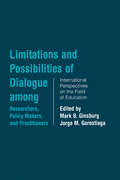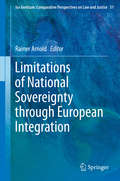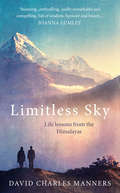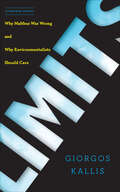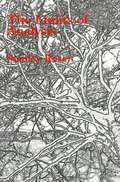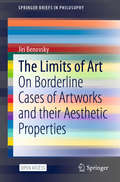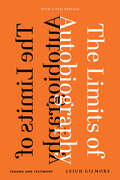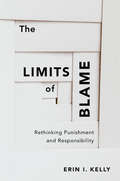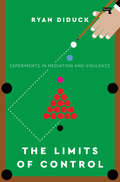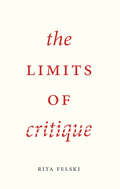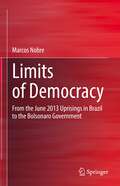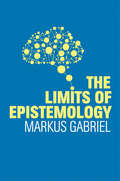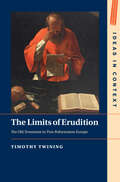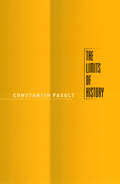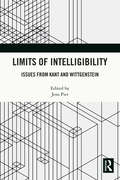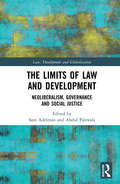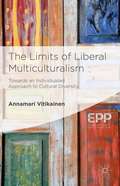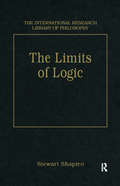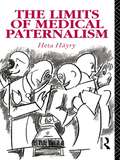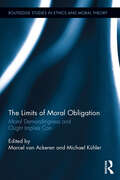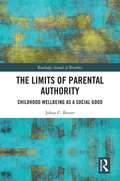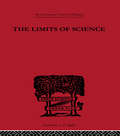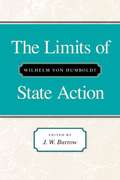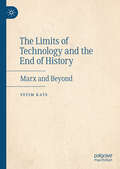- Table View
- List View
Limitations and Possibilities of Dialogue among Researchers, Policymakers, and Practitioners: International Perspectives on the Field of Education (Studies in Education/Politics)
by Mark B. Ginsburg Jorge M. GorostiagaThe chapters in this edited volume raise important issues of the relation between research and its various external "publics".
Limitations of National Sovereignty through European Integration
by Rainer ArnoldThe book considers the changes which national sovereignty has undergone through the supranational European integration. In various contributions by renowned academics and high judges demonstrate the serious impacts of supranationality on the EU member states and even on third countries which are connected with the EU by international treaties. It becomes clear that primacy of EU law, the most significant expression of supra-nationality, collides with national sovereignty as anchored in the national constitutions. The studies clearly show that most member states do not fully deny EU law primacy but are aware of the need to find an adequate balance between the supranational and the national orders. The result from the analyses of the authors from various European countries is that the upcoming constitutional paradigm is "constitutional identity", a concept established by jurisprudence in Germany, France, Czech Republic (without being named so) and debated also in Poland which, herself, denies supranational impact on the national Constitution entirely. Studies on selected EU member states clarify the specific national approaches towards the limitations of their sovereignty as developed by the constitutional jurisprudence (Poland, Czech Republic, Hungary, Romania, Italy, Germany with comparative references to United Kingdom and France). It is illuminated that traditionally strong sovereignty concepts (UK, France) are considerably relativized and functionally opened towards the integration challenges. Basic issues are furthermore reflected, such as the supranational impact on the State's power to reform its Constitution, the relation of national and constitutional identity and the national and supranational perspectives of identity. The book also includes Europe beyond the EU by research on the supranational character of association treaties (from a Ukrainian perspective) and on the Europeanization of a third country preparing EU membership (Albania).
Limitless Sky: Life lessons from the Himalayas
by David Charles MannersThis is the remarkable true story of a young man's initiation in the Himalayas. David Manners was trekking in Nepal when he stumbled upon the mountain home of a jhankri, or Nepalese shaman. The jhankri accepted David as his pupil, and so began the next stage of David's extraordinary journey, in which he embarked upon an adventure that was more challenging and, ultimately, life-affirming than anything he could have imagined. In Limitless Sky, David shares the wisdom and insights he learnt from those transformational days in the Himalayas. These include practical guidance on how to live a full and fearless life, how to find happiness and how to live in ways that nurture both ourselves and others. As David reveals, the life lessons he learned amongst the mountains of the Himalayas could benefit us all today.
Limits: Why Malthus Was Wrong and Why Environmentalists Should Care (Stanford Briefs)
by Giorgos KallisWestern culture is infatuated with the dream of going beyond, even as it is increasingly haunted by the specter of apocalypse: drought, famine, nuclear winter. How did we come to think of the planet and its limits as we do? This book reclaims, redefines, and makes an impassioned plea for limits—a notion central to environmentalism—clearing them from their association with Malthusianism and the ideology and politics that go along with it. Giorgos Kallis rereads reverend-economist Thomas Robert Malthus and his legacy, separating limits and scarcity, two notions that have long been conflated in both environmental and economic thought. Limits are not something out there, a property of nature to be deciphered by scientists, but a choice that confronts us, one that, paradoxically, is part and parcel of the pursuit of freedom. Taking us from ancient Greece to Malthus, from hunter-gatherers to the Romantics, from anarchist feminists to 1970s radical environmentalists, Limits shows us how an institutionalized culture of sharing can make possible the collective self-limitation we so urgently need.
The Limits of Analysis (A Carthage Reprint)
by Stanley RosenPhilosophy in the twentieth century has been dominated by the urge for analysis, a methodology that is supposed to be comparable in clarity and correctness to scientific thought. In this brilliant and devastating attack on such exaggerated claims, Stanley Rosen demonstrates how analysis alone lacks the power to approach the deepest and most important philosophical questions. He thus provides us with a new and deeper understanding of the nature and limits of analytic thinking.
The Limits of Art: On Borderline Cases of Artworks and their Aesthetic Properties (SpringerBriefs in Philosophy)
by Jiri BenovskyThis open access book is about exploring interesting borderline cases of art. It discusses the cases of gustatory and olfactory artworks (focusing on food), proprioceptive artworks (dance, martial arts, and rock climbing qua proprioceptive experiences), intellectual artworks (philosophical and scientific theories), as well as the vague limits between painting and photography. The book focuses on the author’s research about what counts as art and what does not, as well as on the nature of these limits. Overall, the author defends a very inclusive view, 'extending' the limits of art, and he argues for its virtues. Some of the limits discussed concern our senses (our different perceptual modalities), some concern vagueness and fuzzy boundaries between different types of works of art, some concern the amount of human intention and intervention in the process of creation of an artwork, and some concern the border between art and science. In these various ways, by understanding better such borderline cases, Benovsky suggests that we get a better grip on an understanding of the nature of art.
The Limits of Autobiography: Trauma and Testimony
by Leigh GilmoreIn The Limits of Autobiography, Leigh Gilmore analyzes texts that depict trauma by combining elements of autobiography, fiction, biography, history, and theory in ways that challenge the constraints of autobiography. Astute and compelling readings of works by Michel Foucault, Louis Althusser, Dorothy Allison, Mikal Gilmore, Jamaica Kincaid, and Jeanette Winterson explore how each poses the questions "How have I lived?" and "How will I live?" in relation to the social and psychic forms within which trauma emerges. First published in 2001, this new edition of one of the foundational texts in trauma studies includes a new preface by the author that assesses the gravitational pull between life writing and trauma in the twenty-first century, a tension that continues to produce innovative and artful means of confronting kinship, violence, and self-representation.
The Limits of Blame: Rethinking Punishment and Responsibility
by Erin I. KellyFaith in the power and righteousness of retribution has taken over the American criminal justice system. Approaching punishment and responsibility from a philosophical perspective, Erin Kelly challenges the moralism behind harsh treatment of criminal offenders and calls into question our society’s commitment to mass incarceration.
The Limits of Control: Experiments in Mediation and Virulence
by Ryan DiduckRyan Diduck turns his attention to control societies and their protocols in the wake of the global COVID-19 pandemic. What are the political implications of government measures to combat Coronavirus?The end of the world as we know it is no longer imaginary.Severe acute respiratory syndrome Coronavirus 2 (also known as SARS-CoV-2 or COVID-19) is a potent virus that is upturning nearly every aspect of life on earth. But the novel Coronavirus is more than just a virus. It is a marketplace and media event, too, broadcasting at speed, oscillating against the transmission of its mediations. Ultimately, COVID-19 is the pretext upon which nations around the world have enacted social controls of varying severity, strictly limiting the communication, movement, and daily activities of billions of people. This could be a moment of overwhelming consolidation of capital. Or it could further reveal the cracks in a system which has exacerbated the coronavirus pandemic. We are rapidly approaching the limits of control. In the tradition of William S. Burroughs, Naomi Klein, Mark Fisher, and other key theorists of discipline and jurisdiction, The Limits of Control offers a timely new analysis of control societies, and a sibylline roadmap for living together in a hypervirulent world. What we imagine from now on has never mattered more.
The Limits of Critique
by Rita FelskiWhy must critics unmask and demystify literary works? Why do they believe that language is always withholding some truth, that the critic's task is to reveal the unsaid or repressed? In this book, Rita Felski examines critique, the dominant form of interpretation in literary studies, and situates it as but one method among many, a method with strong allure--but also definite limits. Felski argues that critique is a sensibility best captured by Paul Ricoeur's phrase "the hermeneutics of suspicion. " She shows how this suspicion toward texts forecloses many potential readings while providing no guarantee of rigorous or radical thought. Instead, she suggests, literary scholars should try what she calls "postcritical reading": rather than looking behind a text for hidden causes and motives, literary scholars should place themselves in front of it and reflect on what it suggests and makes possible. By bringing critique down to earth and exploring new modes of interpretation, The Limits of Critique offers a fresh approach to the relationship between artistic works and the social world.
Limits of Democracy: From the June 2013 Uprisings in Brazil to the Bolsonaro Government
by Marcos NobreIn this timely book, Brazilian political philosopher Marcos Nobre analyzes the social and political roots of the election of Jair Bolsonaro to the presidency of Brazil and shows how this process is connected to the rise of new far-right movements threatening democracy around the world. Nobre describes the rise of the movement that elected Bolsonaro as a reactionary and anti-democratic highjack of the democratic impulse unleashed by the June 2013 uprisings, when millions of Brazilians took to the streets to protest against a dysfunctional political system, and frames the Brazilian case within the global crisis that exposed the limits of a democracy based on the neoliberal consensus after the 2008 financial crisis. According to Nobre, the June 2013 uprisings in Brazil was part of the global cycle of popular protests that swept many countries between 2011 and 2013, reclaiming a new model of democracy which could go beyond bureaucratic and technocratic parties and cabinets. However, in Brazil, as in many other places, this initial democratic impulse was captured by new far-right movements which are now posing serious threats to democracy. This book intends to collaborate in a change of attitude, both theoretical and practical, that may help finding ways of fighting the authoritarian threat to democracy as well as of deepening democracy as a life form. The decline of neoliberalism not only did not produce any effectively progressive realist alternative, but also opened the way for a dispute over models of society in which democracy itself has ceased to represent the primary reference in disputes over the best way to regulate life in society. Democracy is no longer self-evident, it is in danger. And the only way to save it is by inventing new democratic practices to overcome the limits imposed by institutional political systems no longer capable of channeling the real struggles in the societies they claim to represent.
The Limits of Epistemology
by Markus GabrielAt the centre of modern epistemology lurks the problem of scepticism: how can we know that the forms of our cognition are compatible with the world? How can we state success conditions for knowledge claims without somehow transcending our discursive and fallible nature as knowers? By distinguishing different forms of scepticism, Markus Gabriel shows how all objective knowledge relies on shared discourses and how the essential corrigibility of knowledge claims is a crucial condition of their objectivity. We should understand scepticism not so much as posing a threat, but as offering a vital lesson about the fallibility of discursive thinking. By heeding this lesson, we can begin to reintegrate the solipsistic subject of modern epistemology back into the community of actual knowers. Taking his cue from Hegel, Wittgenstein and Brandom, Gabriel shows how intentionality as such is a public rather than a private phenomenon. He concedes that the sceptic can prove the necessary finitude of objective knowledge, but denies that this has to lead us into an aporia. Instead, it shows us the limits of the modern project of epistemology. Through an examination of different kinds of sceptical paradoxes, Gabriel not only demonstrates their indispensable role within epistemological theorising, but also argues for the necessary failure of all totalizing knowledge claims. In this way, epistemology, as the discipline that claims knowledge about knowledge, begins to grasp its own fallibility and, as a result, the true nature of its objectivity. The Limits of Epistemology will be of great value to students and scholars of philosophy.
The Limits of Erudition: The Old Testament in Post-Reformation Europe (Ideas in Context)
by Timothy TwiningThe history of early modern biblical scholarship has often been told as a teleological narrative in which a succession of radical thinkers dethroned the authority of the sacred word. This book tells a very different story. Drawing on a mass of archival sources, Timothy Twining reconstructs the religious, cultural, and institutional contexts in which the text of the Old Testament was considered and contested throughout post-Reformation Europe. In so doing, this book brings to light a vast array of figures from across the confessional spectrum who invested immense energy in studying the Bible. Their efforts, it shows, were not disinterested, but responded to pressing contemporary concerns. The Limits of Erudition employs a novel conceptual framework to resurrect a world where learning mattered to inquisitors and archbishops as much as to antiquaries, and in which the pursuit of erudition was too important to be left to scholars.
The Limits of History
by Constantin FasoltHistory casts a spell on our minds more powerful than science or religion. It does not root us in the past at all. It rather flatters us with the belief in our ability to recreate the world in our image. It is a form of self-assertion that brooks no opposition or dissent and shelters us from the experience of time. So argues Constantin Fasolt in The Limits of History, an ambitious and pathbreaking study that conquers history's power by carrying the fight into the center of its domain. Fasolt considers the work of Hermann Conring (1606-81) and Bartolus of Sassoferrato (1313/14-57), two antipodes in early modern battles over the principles of European thought and action that ended with the triumph of historical consciousness. Proceeding according to the rules of normal historical analysis—gathering evidence, putting it in context, and analyzing its meaning—Fasolt uncovers limits that no kind of history can cross. He concludes that history is a ritual designed to maintain the modern faith in the autonomy of states and individuals. God wants it, the old crusaders would have said. The truth, Fasolt insists, only begins where that illusion ends. With its probing look at the ideological underpinnings of historical practice, The Limits of History demonstrates that history presupposes highly political assumptions about free will, responsibility, and the relationship between the past and the present. A work of both intellectual history and historiography, it will prove invaluable to students of historical method, philosophy, political theory, and early modern European culture.
Limits of Intelligibility: Issues from Kant and Wittgenstein
by Jens PierThe essays in this volume investigate the question of where, and in what sense, the bounds of intelligible thought, knowledge, and speech are to be drawn. Is there a way in which we are limited in what we think, know, and say? And if so, does this mean that we are constrained – that there is something beyond the ken of human intelligibility of which we fall short? Or is there another way to think about these limits of intelligibility—namely as conditions of our meaning and knowing anything, beyond which there is no specifiable thing we cannot do? These issues feature prominently in the writings of Kant and Wittgenstein who each engaged with them in unique and striking ways. Their thoughts on the matter remain provocative and stimulating, and accordingly the contributions to this volume address the issues surrounding the limits of intelligibility both exegetically and systematically: they examine how they figure in Kant’s and Wittgenstein’s most significant works and put them in touch with contemporary debates that are shaped by their legacy. These debates concern, inter alia, logically and morally alien thought, the semantics and philosophy of negation, disjunctivism in philosophy of perception and ethics, paraconsistent approaches to contradiction, and the relation between art, literature, and philosophy. The book is divided into four parts: Part I gives a first assessment of the issues, Part II examines limits as they feature in Kant, Part III as they feature in Wittgenstein, and Part IV suggests some ways in which the questions might be reconsidered, drawing upon ideas in phenomenology, dialetheism, metamathematics, and the works of other influential authors. Limits of Intelligibility provides insight into a theme that is central to the thought of two of the most important figures in modern philosophy, as well as to recent metaphysics, philosophy of language, philosophy of logic, epistemology, and ethics.
The Limits of Law and Development: Neoliberalism, Governance and Social Justice (Law, Development and Globalization)
by Sam Adelman Abdul PaliwalaThe book examines the well-established field of ‘law and development’ and asks whether the concept of development and discourses on law and development have outlived their usefulness.The contributors ask whether instead of these amorphous and contested concepts we should focus upon social injustices such as patriarchy, impoverishment, human rights violations, the exploitation of indigenous peoples, and global heating? If we abandoned the idea of development, would we end up adopting another, equally problematic term to replace a concept which, for all its flaws, serves as a commonly understood shorthand? The contributors analyse the links between conventional academic approaches to law and development, neoliberal governance and activism through historical and contemporary case studies.The book will be of interest to students and scholars of development, international law, international economic law, governance and politics and international relations.
The Limits of Liberal Multiculturalism: Towards an Individuated Approach to Cultural Diversity (Palgrave Studies in Ethics and Public Policy)
by Annamari VitikainenThe Limits of Liberal Multiculturalism provides a timely analysis of some of the weaknesses, as well as the successes, of the liberal multicultural project. It also takes a step forward by developing a pluralist, individual-centred approach to allocating minority rights in practice.
The Limits of Logic: Higher-Order Logic and the Löwenheim-Skolem Theorem (The International Research Library of Philosophy #18)
by Stewart ShapiroThe International research Library of Philosophy collects in book form a wide range of important and influential essays in philosophy, drawn predominantly from English-language journals. Each volume in the library deals with a field of enquiry which has received significant attention in philosophy in the last 25 years and is edited by a philosopher noted in that field.
The Limits of Medical Paternalism (Social Ethics and Policy)
by Heta HäyryThe Limits of Medical Paternalism defines and morally assesses paternalistic interventions, especially in the context of modern medicine and health care, particular emphasis is given to the analysis of the conceptual background of the paternalism issue. In this book an anti-paternalistic view is presented and defended.
The Limits of Moral Obligation: Moral Demandingness and Ought Implies Can (Routledge Studies in Ethics and Moral Theory)
by Marcel Van Ackeren Michael KühlerThis volume responds to the growing interest in finding explanations for why moral claims may lose their validity based on what they ask of their addressees. Two main ideas relate to that question: the moral demandingness objection and the principle "ought implies can." Though both of these ideas can be understood to provide an answer to the same question, they have usually been discussed separately in the philosophical literature. The aim of this collection is to provide a focused and comprehensive discussion of these two ideas and the ways in which they relate to one another, and to take a closer look at the consequences for the limits of moral normativity in general. Chapters engage with contemporary discussions surrounding "ought implies can" as well as current debates on moral demandingness, and argue that applying the moral demandingness objection to the entire range of normative ethical theories also calls for an analysis of its (metaethical) presuppositions. The contributions to this volume are at the leading edge of ethical theory, and have implications for moral theorists, philosophers of action, and those working in metaethics, theoretical ethics and applied ethics.
The Limits of Parental Authority: Childhood Wellbeing as a Social Good (Routledge Annals of Bioethics)
by Johan C. BesterThis book offers a novel theory of childhood well-being as a social good. It re-examines our fundamental assumptions about parenting, parental authority, and a liberal society’s role in the raising of children. The author defends the idea that the good of a child is inexorably linked to the good of society. He identifies and critiques the problematic assumption that parenting is an extension of individual liberty and shows how we run into problems in medical decision-making for children because of this assumption. He develops an objective conception of what is good for a child in a liberal society, drawing on the assumptions of liberty, and from here constructs a set of things that society and its members owe children. There are ways in which society should support and intervene in parental decisions to guarantee a child’s well-being. Ultimately, raising children is a social activity that requires input from society. The author then applies this theory of childhood well-being to develop a framework for medical decision-making for children. He also uses practical examples, such as vaccinations, parental leave, and healthcare access, to demonstrate the implications of his theory for public policy. The Limits of Parental Authority: Childhood Wellbeing as a Social Good will be of interest to practitioners, scholars, and advanced students working in bioethics, political philosophy, and public health policy.
The Limits of Science: Outline of Logic and of the Methodology of the Exact Sciences (International Library of Philosophy)
by Leon ChwistekThis is Volume III of eight in a series on the Philosophy of Logic and Mathematics. Originally published in 1948, this book portrays an outline of logic and of the methodology of the exact sciences.
The Limits of State Action
by Wilhelm Von HumboldtThe grand, leading principle, towards which every argument . . . unfolded in these pages directly converges, is the absolute and essential importance of human development in its richest diversity. This description by Wilhelm von Humboldt of his purpose in writing The Limits of State Action animates John Stuart Mill's On Liberty and serves as its famous epigraph. Seldom has a book spoken so dramatically to another writer. Many commentators even believe that Humboldt's discussion of issues of freedom and individual responsibility possesses greater clarity and directness than Mill's. The Limits of State Action, by "Germany's greatest philosopher of freedom," as F. A. Hayek called him, has an exuberance and attention to principle that make it a valuable introduction to classical liberal political thought. It is also crucial for an understanding of liberalism as it developed in Europe at the turn of the nineteenth century. Humboldt explores the role that liberty plays in individual development, discusses criteria for permitting the state to limit individual actions, and suggests ways of confining the state to its proper bounds. In so doing, he uniquely combines the ancient concern for human excellence and the modern concern for what has come to be known as negative liberty. J. W. Burrow is Professor of History at the University of Sussex.
The Limits of State Action
by Wilhelm Von Humboldt J. W. BurrowThe Limits of State Action has an exuberance and attention to principle that make it a valuable introduction to classical liberal political thought It is also crucial for an understanding of liberalism as it developed in Europe at the turn of nineteenth century. Humboldt explores the role that liberty plays in individual development, discusses criteria for permitting the state to limit individual action's and suggests ways of confining the state to its proper bounds.
The Limits of Technology and the End of History: Marx and Beyond
by Yefim KatsThis book examines the long-standing belief in infinite scientific and technological progress and links it to the Enlightenment ideal of man as a universal being and subject of the universal world history, destined to become a 'master and possessor of nature.' The author analyzes a broad range of issues in epistemology, the philosophy of history, and the philosophy of science and technology. Marx’s philosophy is explored to the extent that his dialectic of labor sheds light on Western technological optimism and the ideal of human universality and offers an elaborate framework for analyzing the intrinsic limits to technological progress. The focus is on his ‘early’ works, providing a theoretical and humanistic underbelly for the ‘mature’ ideas of the Capital. Examining the epistemic foundations of the belief in infinite progress, the author argues that actual infinity, either in the form of unbounded technological/scientific expansion or infinite complexity of nature, is redundant for the universality of man, his scientific pursuit and historical experience. The conundrum of universality and power calls for a systematic critique of instrumental reason, its practical applicability and value structure.
